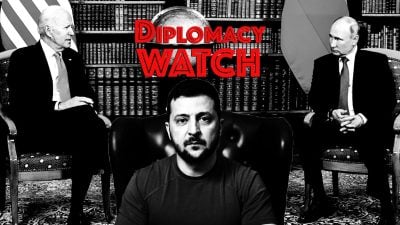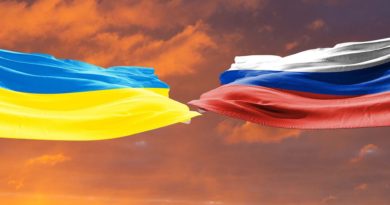Diplomacy Watch: Did Boris Johnson Help Stop a Peace Deal in Ukraine?

To receive Global Research’s Daily Newsletter (selected articles), click here.
Follow us on Instagram and Twitter and subscribe to our Telegram Channel. Feel free to repost and share widely Global Research articles.
***
Russia and Ukraine may have agreed on a tentative deal to end the war in April, according to a recent piece in Foreign Affairs.
“Russian and Ukrainian negotiators appeared to have tentatively agreed on the outlines of a negotiated interim settlement,” wrote Fiona Hill and Angela Stent. “Russia would withdraw to its position on February 23, when it controlled part of the Donbas region and all of Crimea, and in exchange, Ukraine would promise not to seek NATO membership and instead receive security guarantees from a number of countries.”
The news highlights the impact of former British Prime Minister Boris Johnson’s efforts to stop negotiations, as journalist Branko Marcetic noted on Twitter. The decision to scuttle the deal coincided with Johnson’s April visit to Kyiv, during which he reportedly urged Ukrainian President Volodymyr Zelensky to break off talks with Russia for two key reasons: Putin cannot be negotiated with, and the West isn’t ready for the war to end.
The apparent revelation raises some key questions: Why did Western leaders want to stop Kyiv from signing a seemingly good deal with Moscow? Do they consider the conflict a proxy war with Russia? And, most importantly, what would it take to get back to a deal?
For now, we can only speculate about the answers to the first two questions. The third is perhaps no less challenging, especially given the fact that both Ukraine and Russia have (at least publicly) hardened their negotiating positions significantly in recent months. But there are some clues that could help us answer it.
One possible path back to a peace deal is to build on July’s grain agreement, in which Kyiv and Moscow agreed to restart wheat exports from Ukraine’s Black Sea ports. The deal has held strong despite continued hostilities, allowing more than one million metric tons of grain to enter the world market so far. This accord shows that each side is at least interested in reducing the global impact of the war.
The other option is more complex but no less important. Just yesterday, a team of international inspectors arrived at the Russian-held Zaporizhzhia nuclear power plant, which has been threatened by nearby shelling in recent weeks. The visit, which will allow experts to ensure that the plant remains in safe condition, is the result of intensive talks, backed by pressure from the international community. In this case, both Russia and Ukraine are signaling their commitment to avoiding a nuclear catastrophe.
In other words, Kyiv and Moscow have both shown that they want to mitigate the secondary effects of the conflict, and they’re willing to negotiate with the enemy in order to do it. But, as long as this war drags on, people around the world will continue to suffer, and the specter of a catastrophic event — whether through an errant strike on a power plant or an uncontrolled escalation to nuclear war — will continue to loom. It’s time for Russia, Ukraine, and the West to recognize that there’s only one way to put an end to those risks: Lay down arms and come to the negotiating table.
In other diplomatic news related to the war in Ukraine:
— The European Union is expected to suspend a visa agreement with Russia, which will make it more difficult (and more expensive) for Russian tourists to visit countries in the bloc, according to Reuters. The decision is a compromise between EU members that want to ban all Russian travelers from entering the Schengen Zone and others that see such a move as counter-productive. In a joint statement, France and Germany explained their opposition to a full ban: “We caution against far-reaching restrictions on our visa policy, in order to prevent feeding the Russian narrative and trigger unintended rallying-around the flag effects and/or estranging future generations.”
— Russia blocked a UN agreement aimed at shoring up the nuclear non-proliferation treaty (NPT), citing concerns about clauses related to the situation at the Zaporizhzhia nuclear plant, according to the Guardian. The move highlights the negative effect that Russia’s invasion has had on non-proliferation efforts in recent months. But, as Shannon Bugos arguedin Responsible Statecraft, Washington should still do everything in its power to work with Moscow to reduce each country’s nuclear stockpiles. “The framework for a U.S.-Russian arms control arrangement is not perfect and will require concessions from both Washington and Moscow,” Bugos wrote. “[B]ut this is part of the arms control bargain, and the benefits, like the non-use of nuclear weapons in warfare since 1945, have consistently outweighed the perceived costs.”
— On Thursday, French President Emmanuel Macron gave a detailed run-down of his stance toward the war in Ukraine, according to AP. Macron argued that Europe “must get prepared for a long war” in order to put Ukraine in the best possible position for negotiations. He also defended his decision to keep talking with Putin, arguing that “we must do everything to make a negotiated peace possible.”
U.S. State Department News:
In a Tuesday press briefing, spokesperson Vedant Patel responded to concerns that U.S. weapons transfers to Ukraine have dropped Pentagon weapons stockpiles to “uncomfortably low” levels. “The United States has stood with the people of Ukraine for 31 years, and we will continue to firmly stand with them as they defend their freedom and independence,” Patel said. “We are going to continue to stand with Ukraine for as long as that takes.”
*
Note to readers: Please click the share buttons above or below. Follow us on Instagram and Twitter and subscribe to our Telegram Channel. Feel free to repost and share widely Global Research articles.
Featured image is from Responsible Statecraft


